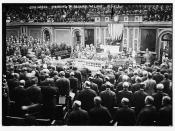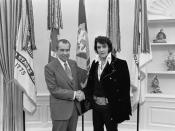The antiwar movement against Vietnam in the US was the most significant movement of its kind in the nation's history. The United States first became directly involved in Vietnam in 1950 when President Harry Truman started to underwrite the costs of France's war against the Viet Minh. Later, the presidencies of Dwight Eisenhower and John F. Kennedy increased the US's political, economic, and military commitments steadily throughout the fifties and early sixties in the Indochina region. Prominent senators had already begun criticizing American involvement in Vietnam during the summer of 1964, which led to the mass antiwar movement that was to appear in the summer of 1965. This antiwar movement had a great impact on policy and practically forced the US out of Vietnam.
Between 1965 and 1968 the American military effort in Vietnam accelerated and so did the Anti-War movement, with the number of critics in congress and the media growing.
This was mainly due to the massive increase in troops being sent to Vietnam. And also The infamous Operation rolling thunder which was the code name for a sustained bombing campaign against North Vietnam conducted by United States armed forces during the Vietnam War. Its purpose was to destroy the will of the North Vietnamese to fight, to destroy industrial bases and air defenses Surface-to-air missile or SAMs, and to stop the flow of men and supplies down the Ho Chi Minh Trail.
Americans were soon shocked to learn about the communists' massive Tet Offensive on January 31, 1968. The offensive demonstrated that Johnson had been making the progress in Vietnam seem much greater than it really was; the war was apparently endless. Critics of the administration policy had been right after all. For the first time, the state of public opinion was the crucial factor in decision...


